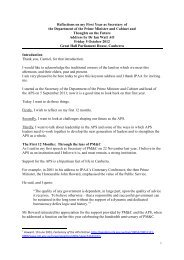Cabinet Handbook - The Department of the Prime Minister and ...
Cabinet Handbook - The Department of the Prime Minister and ...
Cabinet Handbook - The Department of the Prime Minister and ...
You also want an ePaper? Increase the reach of your titles
YUMPU automatically turns print PDFs into web optimized ePapers that Google loves.
11. <strong>Minister</strong>s <strong>of</strong> State including <strong>Cabinet</strong> members, o<strong>the</strong>r ministers <strong>and</strong> parliamentary secretaries<br />
(‘<strong>the</strong> Ministry’) form <strong>the</strong> Federal Executive Council—<strong>the</strong> body which formally advises <strong>the</strong><br />
Governor-General on <strong>the</strong> administration <strong>of</strong> <strong>the</strong> Commonwealth <strong>of</strong> Australia.<br />
Principles <strong>of</strong> <strong>Cabinet</strong> Government<br />
Guiding principles<br />
12. A Westminster-style <strong>Cabinet</strong> is defined by adherence to <strong>the</strong> principles <strong>of</strong> collective responsibility<br />
<strong>and</strong> <strong>Cabinet</strong> solidarity. <strong>The</strong>se principles are <strong>the</strong> binding devices that ensure <strong>the</strong> unity <strong>of</strong> purpose <strong>of</strong> <strong>the</strong><br />
Government. <strong>The</strong>y underpin <strong>the</strong> formulation <strong>of</strong> consistent policy advice <strong>and</strong> <strong>the</strong> exercise <strong>of</strong> collective<br />
accountability.<br />
Collective decision-making <strong>and</strong> responsibility<br />
13. <strong>The</strong> <strong>Cabinet</strong> system <strong>of</strong> government is founded on <strong>the</strong> principle <strong>of</strong> collective responsibility. It<br />
reflects democratic principle: <strong>the</strong> Parliament expresses its confidence in <strong>the</strong> collective whole-<strong>of</strong>government<br />
ra<strong>the</strong>r than in individual ministers. Similarly, <strong>the</strong> Governor-General, in acting on ministerial<br />
advice, needs to be confident that individual ministers represent <strong>of</strong>ficial government policy. In all areas<br />
<strong>of</strong> <strong>the</strong>ir work, <strong>the</strong>refore, ministers represent <strong>and</strong> implement government policy—policy which has <strong>of</strong>ten<br />
been considered <strong>and</strong> set by <strong>the</strong> <strong>Cabinet</strong> process.<br />
14. In practice this means that a decision <strong>of</strong> <strong>the</strong> <strong>Cabinet</strong> is binding on all members <strong>of</strong> <strong>the</strong><br />
Government, regardless <strong>of</strong> whe<strong>the</strong>r <strong>the</strong>y were present when <strong>the</strong> decision was taken or <strong>the</strong>ir personal<br />
views. Issues may, <strong>and</strong> should, be debated vigorously within <strong>the</strong> confidential setting <strong>of</strong> <strong>the</strong> <strong>Cabinet</strong><br />
meetings. <strong>The</strong> aim is to reach some form <strong>of</strong> consensus so that <strong>the</strong> <strong>Prime</strong> <strong>Minister</strong>, as Chair <strong>of</strong> <strong>the</strong><br />
<strong>Cabinet</strong>, can summarise what <strong>the</strong> collective decision is for recording in <strong>the</strong> <strong>Cabinet</strong> minute.<br />
15. All members <strong>of</strong> <strong>the</strong> Ministry are understood to have participated in <strong>the</strong> decision-making process<br />
which underpins government policy, <strong>and</strong> <strong>the</strong>refore share responsibility for those policies.<br />
<strong>Cabinet</strong> solidarity<br />
16. <strong>Cabinet</strong> collective responsibility is most obviously expressed in <strong>the</strong> principle <strong>of</strong> <strong>Cabinet</strong> solidarity.<br />
In governments using <strong>the</strong> Westminster system, members <strong>of</strong> <strong>the</strong> <strong>Cabinet</strong> must publicly support all<br />
government decisions made in <strong>Cabinet</strong>, even if <strong>the</strong>y do not agree with <strong>the</strong>m. <strong>Cabinet</strong> ministers cannot<br />
dissociate <strong>the</strong>mselves from, or repudiate <strong>the</strong> decisions <strong>of</strong> <strong>the</strong>ir <strong>Cabinet</strong> colleagues unless <strong>the</strong>y resign<br />
from <strong>the</strong> <strong>Cabinet</strong>. It is <strong>the</strong> <strong>Prime</strong> <strong>Minister</strong>’s role as Chair <strong>of</strong> <strong>the</strong> <strong>Cabinet</strong>, where necessary, to enforce<br />
<strong>Cabinet</strong> solidarity.<br />
Operational principles<br />
17. <strong>The</strong> proper implementation <strong>of</strong> <strong>the</strong>se two guiding principles is entirely dependent on a<br />
commitment to three important operational values: consultation, confidentiality <strong>and</strong> respect for <strong>Cabinet</strong><br />
authority.<br />
9




